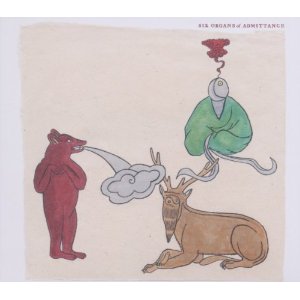In that Asleep On The Floodplain, with its perfunctory two sides or single mirrored circle, is nothing more grand than an album, a strange detractor could dub it a scaling back of ambitions, compared to the last Six Organs Of Admittance album. Empty The Sun, released in 2009, was packaged with a novel – not by Ben Chasny, whose solo music has generally been recorded under this name, but by LA writer Joseph Mattson, whose mixture of fantastical imagery and realist drudgery proved to be a terrific fit for the music it accompanied. You feel a bit of a chump sitting there leafing through pages the size of an LP cover, as it goes, but hey ho.
Grand a plan as this might have been, it would be harsh to expect each subsequent Six Organs Of Admittance release to be some sort of multimedia jamboree. Much of what makes Chasny such a likeable musical figure, I feel, is the apparent breeziness of his demeanour, and his laissez-faire approach to his craft. "This record was recorded in various ways at home from the year 2007-2010," notes Asleep On The Floodplain‘s sleeve, betraying his taste for skipping between projects and general fancies. His primary focus last year was Rangda, a trio which also includes drummer Chris Corsano and Richard Bishop of Sun City Girls, and combines each member’s respective talents in heroically democratic fashion. Before, he’s dallied with Comets On Fire, August Born, Badgerlore and others. For all that this might imply a dilettantish spirit, it’s very rare to encounter a Chasny recording that appears dashed-off or slack, and these ten fine songs of winding, bonfire-smoked folk certainly don’t fit that description.
For a largely instrumental album, Asleep On The Floodplain leans on imagery and (non-musical) inspiration to a notable degree. Chasny uses nostalgia as a springboard, not a crutch; in his recent Quietus interview he stated that the album’s title refers to a dream about his childhood home, and the floods which threatened it each year. It would be projecting to state that this is apparent in the music, but there is a prevalent warmth, an intimacy in the intricacy. It says here that the opening song, ‘Above A Desert I’ve Never Seen’, was written by Chasny while in bed sick, in which case one is compelled to marvel at the way his hands can battle through lurgies like it weren’t no thang. As he recently went on record expressing mild annoyance at the way psych-folkists like himself shoulder lazy John Fahey comparisons, I’ll refrain from doing so here, but… well, it’s not in markedly different territory.
In the main, the songs with vocals represent the album’s more accessible, stolidly folk-rock side. This isn’t to run down ‘Light Of The Light’ or ‘Hold But Let Go’, which are both credibly languid in the manner of 70s cultists like Simon Finn and Gary Higgins (whose 21st century profile is largely thanks to Chasny). Indeed, they sit well next to more ‘out’ moments: ‘Brilliant Blue Sea Between Us’, where dustily droning organ tussles with guitars that sound like bells; ‘River Of My Youth’ – a dream featuring this much water can have grave consequences, right? – on which his other half, Elisa Ambrogio of Magik Markers, throws some vocals into the creaking industrial atmosphere. Best of all on this front is ‘S/Word And Leviathan’, the dense and tumbling feel created by a fingerpicked saz and augmented by ghostly, submerged vocal sound. Given the those-who-know-will-know sleeve dedication to the late Jack Rose ("Missing you, Dr. Ragtime"), it seems reasonable to note that this track bears some resemblance to his old band Pelt, once the drone guitars arise and conquer.
A figure of approximately equal importance as Rose to the scene both operate(d) in, Ben Chasny’s outstanding hit rate makes writing about him a predictable task – at least, if you wish to talk about anything beyond how the songs on this or that record sound. That is to say: as Six Organs Of Admittance albums go, Asleep On The Floodplain is not a major departure, and is no more likely to make a star of him then the previous dozen or so. Its intentionally personal approach ensures it has no specific relevance to musical culture circa 2011, except in one sense – the most important one, that of being 43 minutes of highly creative and often beautiful music.


